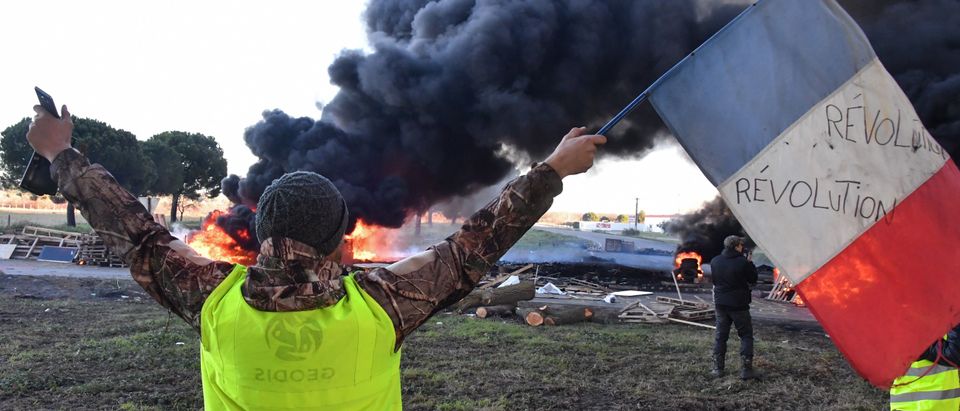As the worst unrest to grip France in 50 years rages on, triggered by a pending climate change fuel tax (since postponed), President Macron announced a slate of measures designed to appease the masses. Included in the government giveaways: a minimum wage hike of about $1.75 an hour, no taxes on overtime pay and reforming pension benefits for low-wage earners.
Macron said in a national address, “I know I’ve hurt some of you with my words” and then declared “an economic and social state of emergency.” But perhaps that state of emergency is due to the protesters viewing the proposed “green” fuel tax increase is a little more harmful than words.
Meanwhile, the unrest in France appears to be spreading elsewhere in Europe.
Here in America, will Democratic members of Congress and their climate activist allies learn the lessons of France?
If France can erupt into riots over what amounted to a 25 cent per gallon tax hike on gas — 10 cents on diesel — on top of fuel prices of a little more than $7 per gallon, imagine the electoral drubbing that awaits a party that enacts far higher fuel taxes. But more on that in a moment.
Of course, prior to enacting any ambitious program of tax hikes, carbon dioxide emission restrictions, mandates, subsidies, and a large government R&D push, the stage must be set. These ideas must gain public acceptance.
With only 45 percent of Americans seeing global warming as a serious threat in their lifetimes, more work has to be done to convince U.S. voters to accept actions that will cause their standards of living to fall.
That’s where climate change studies, with their temperature models and allied economic assumptions come in. It’s also where things start to get hinky. The global temperature predictions published by the latest U.N. Intergovernmental Panel on Climate Change say the planet is likely going to be another 0.5 degrees Celsius warmer sometime between 2030 and 2052.
To prevent that 0.5-degree increase from going higher, the U.N. experts estimate that there will have to be some sort of global tax on carbon dioxide equivalents of something in the range of $157 to $7,018 per ton by 2030 (in current dollars).
Since each gallon of gasoline produces about 20 pounds of CO2 when it’s burned, the U.N. recommended carbon tax on gas could range from $1.41 per gallon all the way up to $63.66 (revised up from $49 per gallon in 2010 dollars in the U.N. climate report draft released in October).
This is a pretty wide range for both the projected rate of warming and the costs estimated to combat it.
So here’s an analogy. As a homeowner, you suspect your roof may leak in bad weather. But you’re not sure if there’s really a leak, or how bad it may be. You do know that the weather forecast says a category 5 hurricane may hit in a week or so (and it may not), and that weather event could include tornados and lightning. You’re understandably worried, so you call a roofer for a repair estimate.
But when that estimate comes back, it’s anywhere from $1,570 to $70,180. And the roofer warns you that if the worst-case scenario happens, your house will be flattened anyway, so the roof won’t matter.
With such big unknowns for the weather and no firm cost—or real guarantee—for the roof repair, no one would blame you for putting off the repair, until you were sure there’s a leak in the first place.
In the same way, we have no firm costs and no real guarantees with carbon taxes. Those unelected U.N. report-writers may be comfortable calling for climate change gas taxes as high as $64 per gallon — or just $1.41 per gallon — but the actual elected politicians in France are about to be turned out of office for daring to impose a 25-cent-per-gallon tax.
American climate activists are trying to be a little more subtle about it, and this is where the “Green New Deal” comes in. As Representative-Elect Alexandria Ocasio-Cortez describes it, “This is going to be the New Deal, the Great Society, the moon shot, the civil-rights movement of our generation.”
Rather than raise taxes directly on energy — something that would be transparent, honest and efficient economically (while being deadly at the ballot box) — the Green New Deal aims to seize control of the economy by promising a “green” job to every American who wants one.
The promised employment would include things like building electric cars and installing wind turbines and solar panels. And of course, the jobs would be union jobs (with the added bonus that 99.9 percent of the dues money would go to Democrats).
This massive intervention in the American economy would end up costing voters the equivalent of $1.41 to $64 dollars per gallon in indirect costs brought about by government intervention. It’s just that the costs would be hidden. The cost of living — for fuel, food, electricity — would soar, but direct taxes on the consumer would be obscured.
The funny thing about the Green New Deal is how much it looks like standard, old-school progressive politics from the 1930s, just dusted off and given a new, urgent patina to address the threat of climate change.
The Green New Deal isn’t green, it isn’t new, and it’s not a deal.
Chuck DeVore is vice president of National Initiatives with the nonprofit Texas Public Policy Foundation and was a California state assemblyman from 2004 to 2010.
The views and opinions expressed in this commentary are those of the author and do not reflect the official position of The Daily Caller.


